You can read this exclusive content thanks to the FALATH & PARTNERS law firm, which assists American people with Slovak roots in obtaining Slovak citizenship and reconnecting them with the land of their ancestors.
Most people featured in this series are separated from their Slovak roots by several generations. Tom and Šárka Posey, a couple from Texas, offer a different story—one that bridges the past and present in a more immediate way.
While Tom was born on the other side of the Atlantic Ocean, Šárka was born in Czechoslovakia, or to be more precise in the territory of what is now Czechia. Her family soon moved to Piešťany in Slovakia, where she grew up. Eventually, she went to the US, where she and Tom met. And the rest, as they say, is history.
As they grow older, they find they are desirous of holding onto their traditions and roots, something they both find can be had when they regularly visit Šárka's mother in Slovakia. Now, together with their two sons, they are seeking Slovak citizenship.
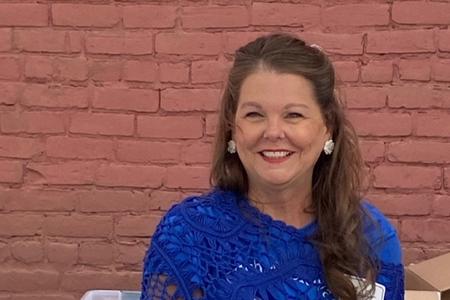
Where her heart is
When asked about his ancestors, Tom said that he is a "very typical American" in this regard.
"The family lore is that the first Posey in America came over in 1640. He arrived in South Carolina and his name was Francois Pochet. I really wish I still had his name because Pochet sounds so much better than Posey. He was a French Huguenot seeking religious freedom. Beyond that my family background is largely English and Scottish."
He grew up in Houston and is a Texan through and through; he used to have a horse and still has a six gun revolver, like in the old Western movies.
On the other hand, Šárka's mother is Czech and father Slovak. Growing up, her dream was to go to and live in the United States. After the fall of the Berlin Wall, there was nothing to hold her back. Her mother is the only surviving parent, Tom's had already passed away.
"For the past maybe six years, maybe longer, I've been feeling like home is back in Europe. I really feel just happier in Slovakia. As soon as we cross the border, I'm just, wow, this is home, the way the land looks, the way the trees are. My kids look at me, they're like mom, what are you talking about?" Šárka says, laughingly.
"This is where my heart is," she says. Tom quickly catches on: "It's so green, it's so verdant, it's really pretty." According to them, the family enjoys hiking and seeing castles all over the country.
Tom actually visited Slovakia about a year after he met Šárka.
"Let me tell you, that was an experience. Slovakia now is a lot better than it used to be. My impression back then was grey concrete buildings, pretty land, and not much else. It's interesting that it's gotten to be a place I like so much, actually," he says.
Also, both agree that when the family is in Slovakia, they always start to feel better physically than when in the US and say that it's probably due to the food, as even quality organic food in the US is not healthy.
Holding onto traditions
According to Tom, as they got older, they both have "moved back towards their roots and become more conservative and traditional".
"I love the United States, but we don't have very many traditions. In Slovakia, we saw the traditional dancing, we just came to love it. I guess culture and traditions are something that I really started to like. It feels good to be in that environment. And also Slovakia is more conservative than the US," he says, adding that to him it feels good to have more of a nuclear family, even though he's more of an adopted member. "My parents have passed away, so it's really the warmth of tradition and family."
"The wonderful thing about Slovakia are the traditional values, that people have their families nearby. They get to see each other, they get to do things together. Having grandparents around, it's having the wisdom and emotional support for kids, where you can ask questions, to be the guiding light," Šárka adds.
The family will be spending this Christmas in Slovakia and they are looking forward to it. For Tom and Šárka, the season is tied to the Lúčnica folk ensemble they saw many years ago. According to Tom, he really doesn't like carp very much, but on the other hand, likes another traditional Christmas dish, kapustnica.
"There is not much Slovak food I don't like. I also love bryndzové halušky. I guess when I think of Christmas in Slovakia, I think of the of the straw decorations, the ornaments on the tree. It has a less glitzy feel to it. It kind of leaves more room for just being nice, and with the family, not about presents," Tom says.
Šárka observes that Christmas celebrations in the US often have a strong commercial focus. She also expressed her personal preference for a more religious interpretation of the holiday, mentioning that the emphasis on Santa Claus and gift-giving can often overshadow its spiritual origins. "It's not about the birth of Christ, it's all about the presents [in the US]," she shares, reflecting on her perspective. "It's no longer Christmas, it's holidays," she also notes. However, America is a big and diverse country and religion and nativity scenes still matter to many Americans.
Tom adds that while the US celebrates major holidays like Thanksgiving and Christmas, its cultural traditions may feel less rooted or cohesive compared to older nations in Europe.
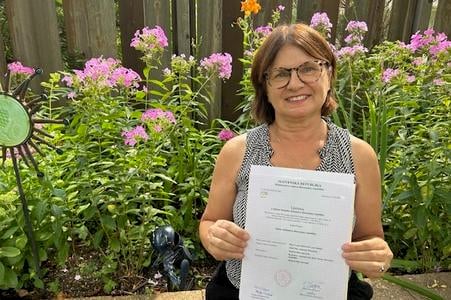
Experiencing the world out there
Šárka at the moment has Czech citizenship which was automatically assigned because of her place of birth. Interestingly, she does not speak Czech as her native language, but Slovak. When Czechoslovakia dissolved, there was an option to choose which citizenship to keep but it had to be done in person. As Šárka was already in the US by then and the window to choose the citizenship was so small, it didn’t seem practical to her to return and go through all the paperwork.
Anyway, this year the whole family applied for Slovak citizenship. Šárka and both boys are entitled to it by descent from her father Ivan.
At the moment, dual citizenship allows them to travel a lot around the world. In addition to various places, generally speaking, they spend an equal time in Texas, Florence in Italy, and Piešťany in Slovakia.
"At least our grandmother doesn't get tired of us," says Šárka.
They have come to like Florence probably for the same reason they like Slovakia. One of the reasons they decided on Italy is that due to travelling, they homeschool the boys. In the US and Italy, homeschooling is completely legal, but not in Slovakia. Since the distance to Slovakia is not too great, they decided to establish a home in Italy too. In addition, the town and the countryside is very similar to Slovakia.
Although the time is currently evenly split between the three places, they expect they will spend substantially more time in Europe.
According to Šárka, when it comes to homeschooling, they pursue what is called the Socratic method and use questioning to develop thinking skills. At the moment, both boys are undergoing the Great Books courses, which involves reading reading literature from Shakespeare and Plato, as well as books such as Orwell’s 1984 and Dostoevsky’s Crime and Punishment. In addition, they are part of small online groups and get together with other children and teachers to discuss what they have read.
"Homeschooling has allowed us to go and see different places and spend substantial time there. The kids do not constantly sight-see. But it has allowed them to see there is a world out there, different countries, different ways of doing things," Šárka adds.
Just recently, they spent a month in Mexico and experienced Día de los Muertos, the Day of the Dead.
"These people have a completely different perspective on death, they celebrate, laugh, eat food. According to our taxi driver, it's the celebration of the new beginning. For them, death is not the end. Homeschooling allows us to do things like this. It's not just reading about these things in books," Šárka says. "Next year, we’re looking forward to All Saints Day in Slovakia!"
Spectacular Slovakia travel guides
A helping hand in the heart of Europe thanks to our Slovakia travel guide with more than 1,000 photos and hundred of tourist spots.
Our detailed travel guide to the Tatras introduces you to the whole region around the Tatra mountains, including attractions on the Polish side.
Lost in Bratislava? It's impossible with our City Guide!
See some selected travel articles, podcasts, traveller infoas well as other guides dedicated to Nitra, Trenčín Region, Trnava Region and Žilina Region.


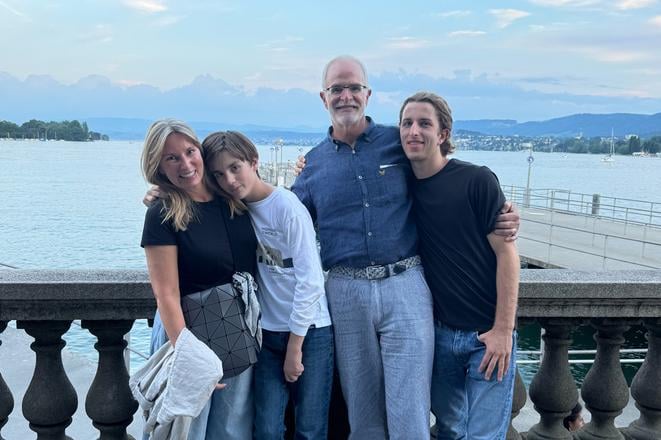 Tom, Šárka and their two boys in Switzerland. (source: Archive of the Posey family)
Tom, Šárka and their two boys in Switzerland. (source: Archive of the Posey family)
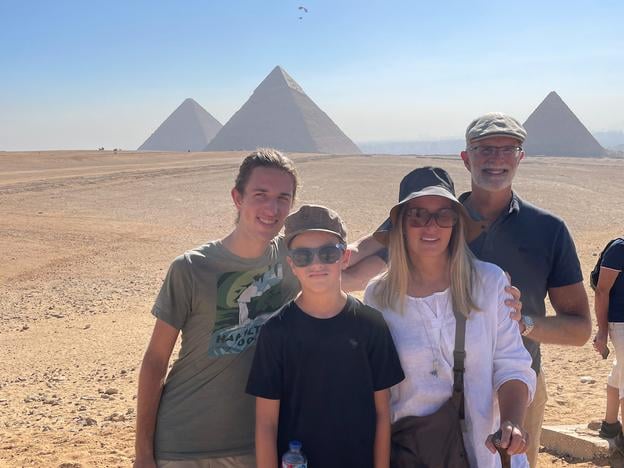 Šárka, Tom and their two boys in Egypt. (source: Archive of the Posey family)
Šárka, Tom and their two boys in Egypt. (source: Archive of the Posey family)
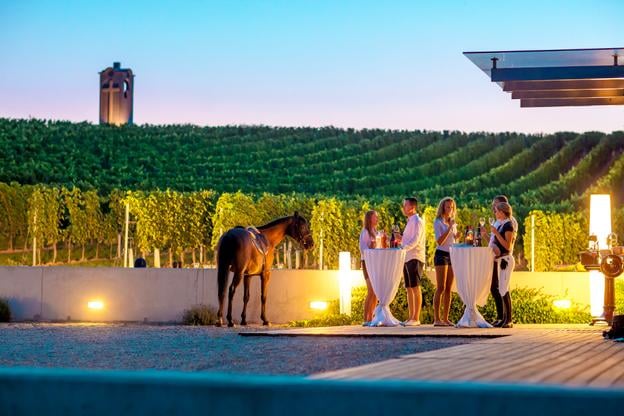 Terra Parna Winery (source: Courtesy of Trnava Región)
Terra Parna Winery (source: Courtesy of Trnava Región)